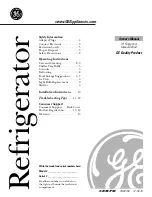
8
I
f the refrigerator has been
flooded, subsequent use is only
permitted in the
event it has been
checked by a
service center
representative.
O
therwise, there is danger of
electric shock or fire.
I
n order to transport the
refrigerator, hold
it by the handles
located on the
front at the
bottom and in the back at the
top.
I
f handled differently, your hands
may slip off the refrigerator,
which can lead to injury.
D
o not use flammable materials
like ether, gasoline, ethanol,
liquefied petroleum gas (propane
or butane), spray
cans, or cosmetics
near the
refrigerator. Do
not store explosive substances
such as aerosols cans with a
flammable propellant in this
appliance.
T
his can cause an explosion or fire.
D
o not place light candles in the
refrigerator to eliminate
unpleasant odours. Do
not use a hairdryer to dry
the interior of the
refrigerator.
T
his can cause an explosion or fire.
NO
D
o not put animals in
the refrigerator.
NO
B
e careful when opening and
closing the refrigerator doors, as
one may injure
others in the
vicinity.
W
hen opening
and closing doors,
hands and feet may get caught
in them, and a child may be
struck by the corner of a door.
NO
D
o not store scientific materials
in the refrigerator.
S
torage of materials that
require strict
maintenance of a
temperature range
can result in their loss
or unexpected chemical
reactions, which can be
dangerous.
NO
I
f there is a gas leak, do not
touch the refrigerator or outlet.
Immediately air out the premises
and contact the
service center.
I
f in the process
of transport,
installation, or
operation some kind of
damage leads to a gas leak, any
spark can cause a fire or
explosion.
D
o not spray water on the
external and internal
surfaces of the
refrigerator or clean it
with solvents.
T
his may cause a short-circuit or
electric shock.
NO
D
o not put your hands or any
other objects in the vents under
the lid, or the
openings located
on the rear of the
refrigerator.
T
his could cause
electric shock or
injury.
NO
INTRODUCTION









































